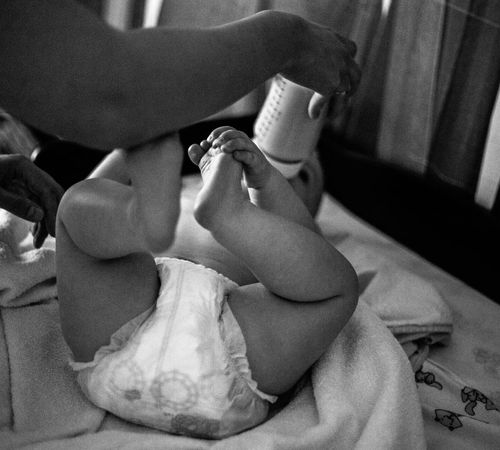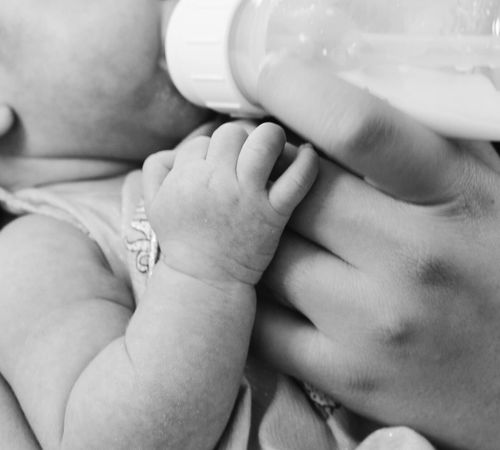Has the 4 month sleep regression hit you hard? Short naps, constant night wakings, and a BAD MOOD are everywhere? Well, don't despair, dear parent! Here is your ultimate guide on how to survive the 4 month sleep regression and come out alive.
You're not dreaming. You are not imagining it. You thought it would only happen to others, and yet here you are. Your time has come.
THE 4 MONTH SLEEP REGRESSION IS HERE!
Run, everybody, run!
No, of course, I am just kidding, even though you might not find it that funny considering your situation. But don't be afraid nor despair, dear mama! You are not alone, and it's temporary.
So what's this 4 month sleep regression all about, and most importantly, how and when will it pass? Read on to find out what it is and how you can survive it with a genuine smile on your face.
This article covers:
- What Is The 4 Month Sleep Regression?
- What Causes The 4 Month Sleep Regression?
- What Are The Typical Signs?
- How Does It Affect Your Baby's Sleep?
- How Long Does The 4 Month Sleep Regression Last?
- What About Sleep Associations?
- How To Survive The 4 Month Sleep Regression
- Is The 4 Month Sleep Regression Really That Bad?
What Is The 4 Month Sleep Regression?
A sleep regression is a period of time in which your baby suddenly changes its sleep behavior. Such sleep regressions are happening either due to developmental leaps or because their brain is developing.
While your baby will go through several sleep regressions, the 4 month sleep regression is considered the biggest one with the most noticeable impact on your baby's sleep.
A sleep regression sets a big developmental milestone. It marks changes in your baby's cognitive development and is, in fact, a progression of their physical and mental abilities. That's why some prefer to call them sleep progressions instead of sleep regressions.
What Causes The 4 Month Sleep Regression
The 4 month sleep regression is linked to a permanent change in your baby's sleep cycle. Until now, your baby had the sleep cycle of a newborn. A newborn's sleep cycle is about 40-60 minutes long and only consists of two stages: a light sleep stage called REM sleep and a deep sleep stage called non-REM.
When your baby would fall asleep, they would first fall into light sleep and then into deep sleep. The time in both those sleep stages is evenly divided. So a newborn spends about the same amount of time in light sleep as in deep sleep.
Now, with the 4 month sleep regression, your baby develops two additional sleep stages, and their sleep cycle becomes more similar to an adult's sleep cycle.
But not only the change in your baby's sleep cycle causes this regression. There is also a lot going on in your baby's environment that can add to the intensity of the 4 month sleep regression:
- Your baby learns to roll over: Many babies at this age learn to roll over. This is a huge step for your baby as they now start to get more mobile.
- Increased Awareness: Your baby also becomes more aware of their surrounding, faces, and noises and is more interested in play. The world is just too exciting to sleep!
- Needing less sleep: Your baby has now officially ended their newborn phase. They will need less sleep than before, and now it can go fast. They are able to handle wake windows for up to 90-120 minutes.
- Teething: Some babies start teething at 3-4 months. It doesn't mean that teeth are already coming soon, but it may be really itchy already.
- Baby needs more calories: Now your baby's tummy is all up and running. With becoming more mobile and getting visibly bigger, they might need more calories at night.
How Does It Affect Your Baby's Sleep?
The bad news about the 4 month sleep regression is that those two new sleep stages are both light sleep stages. And even though REM sleep is considered light sleep, those new two sleep stages are even lighter sleep. So now, your baby spends more time in light sleep than in deep sleep. In lighter sleep, they will wake more easily because of noises, lights, or any other sleep disruption.
Also, due to the increased light sleep, your baby might now wake fully after EVERY.SINGLE.SLEEP CYCLE.
YAAAY!

And once your baby is awake, they might need your assistance to fall back to sleep.
Another thing is that their daytime sleep cycles also decrease to 25-45 minutes and their nighttime sleep cycles shorten to about 1.5-2 hours.
What Are The Typical Signs?
There are several signs that point to a sleep regression. In general, your baby's sleep pattern will worsen, meaning they will wake more often or sleep for a shorter amount of time.
Typical signs your little one has hit the 4 month sleep regression are:
- Short nap: your baby is suddenly only taking short naps of 20-40 minutes.
- Frequent night wakings: your baby is waking more often at night, often every 1.5 hours, even though they used to sleep longer stretches
- Fussiness: your baby appears to be more fussy and irritated. They seem to be easily overstimulated by their surroundings
- Fighting sleep: some babies appear to be fighting bedtime and naps. Your baby seems to need less sleep overall
- Need for closeness: your baby wants to be carried around all the time and can be barely put down. They prefer contact naps and nurse more frequently
How Long Does The 4 Month Sleep Regression Last?
Babies can go through the 4 month sleep regression from 3-5 months. For most of them, however, it happens at the 4 month mark (hence the name).
The regression usually lasts from 2-4 weeks. Your baby will seem fussier and more sensitive during this period. After the sleep regression, some babies go back to sleeping well or, let's say, like a baby. But for some babies, those permanent changes are unfortunately to stay, at least partially. Cat naps can resolve themselves or get better. But sometimes babies will continue to wake more frequently at night.
However, you can still help your baby adjust to their new sleep pattern and introduce some new sleep habits that can improve their sleep again.
What About Sleep Associations?
Sleep training is not the ultimate master super solution to a sleep regression. A sleep regression is not only about sleep. Remember, there are so many things happening in your baby's brain, and they need to cope as well. A sleep regression is also a time to bond with your baby and be there for them.
It's time to learn to self-soothe, said every baby sleep consultant ever.
So while it's never a bad idea to start with healthy sleep habits, it can be already challenging to get a baby that is going through the 4 month sleep regression to sleep. So specific sleep associations can actually make things easier.
We need to stop thinking of a sleep prop or a sleep association as the devil and instead actually use them to our advantage. You can use these associations, for example, to make them nap longer. Or you can use light sleep associations such as patting and shushing to ease into independent sleep.
All I am saying is that this is not the time to stress about how much you should and shouldn't help your baby fall asleep. Because it's not the solution, you are hoping for.
Instead, you can introduce more consistency to the day, more regular nap times, and other associations to help your baby sleep better.
How To Survive The 4 Month Sleep Regression
1. Self-Care
The first thing you should always do when sleep gets tough is to take care of yourself. Sleep deprivation is not only about sleep. You need to fill your cup as a human being to handle nighttime parenting. Even when your baby is not going through a sleep regression, self-care is key to being a happy parent.
2. Give Them Enough Time To Practise
If your baby is learning new skills like rolling over, make sure that they get the chance to practice their new skills during the day. Have tummy time and let them explore. It is important to fill your baby's sensory cup to improve sleep.
3. Adjust Your Expectations
When you browse the internet, you will read about all kinds of abilities your baby should already have at this age. You need to ween them of sleep props, they need to be put down awake. Please remember that you are dealing with a 4 month old baby. They have still spent more time inside your womb than in this big world.
Don't obsess about teaching your baby to self-soothe. Instead, start implementing healthy sleep habits that are easy to implement.
Starting good sleep habits is not the same as letting your baby cry it out.
4. Set The Right Stage
If you haven't done so until now, then it's the right time to set up your baby's sleep environment for optimal sleep. Use black-out curtains to keep it dark and white noise to mask unwanted outside noises (remember the light sleep?). Start using a sleep sack to make your baby feel more comfortable and better control their temperature.
5. Have Full Feeds At Night
Some babies may need more calories at night. Your baby may fall asleep before they can even get a full feed and then wake up shortly after because they are hungry again.
By making sure your baby has a full feed after a night waking, you can rule out hunger if they wake up again shortly after. Sometimes it can also help them sleep for a longer stretch. If you have offered, for example, one breast at night, try offering both breasts. If your baby falls asleep at the breast, you can try changing the diaper before offering the other side to keep them slightly awake.
6. Start A Bedtime Routine
This is also a good age to start a bedtime routine. It can include cleaning baby up, putting on pajamas, and reading a colorful book. Your baby is still young, so a short routine is enough. But it will still help your baby wind down for the night.
7. Concentrate On One Long Lunch Nap
During such a phase, it can often be helpful for parents if they at least get one break during the day. You can start to work on your baby's sleep just for the lunch nap. You will not believe what a change one long nap during the day can make.
Determine the best nap time for your baby after lunch and try to lengthen that nap. Don't stress about all the other naps of the day. Get them to sleep any way and anywhere you like for the morning and afternoon nap, but try to stay home for the lunch nap.
You can read in my article below how you can extend your baby's lunch nap.
8. Get Them Enough Sleep
Even though your baby's sleep might be more fragmented, it's important that they get enough sleep. Sometimes they will even need more sleep during a regression because of exactly that. Learn your baby's sleep cues and age-appropriate wake windows.
It is very unlikely that babies build up sleep debt. That happens only very rarely, but you simply might just have to deal with an overtired baby and a really bad mood.
9. Creative Positive Associations For Your Baby
It's important to still make sleep a positive experience for your baby. Make them feel safe and secure when falling asleep to keep up a positive association about sleep. Even if sleep seems like a fight sometimes, holding them and comforting them through their emotions gives them reassurance that they can count on you and that you are always there for them.
Is The 4 Month Sleep Regression Really That Bad?
The truth is that the 4 month sleep regression is really hyped in the baby sleep community. Some parents don't even notice their baby going through this phase.
Disrupted sleep and short naps are part of normal infant sleep behavior, even if it is hard to cope with this as parents. Instead of accepting what it is, we often look for reasons to explain it. If we have something at hand, a real cause, a name for what's going on, it gives us closure, maybe even the feeling that we can somehow control it.
But sometimes, there is not much to control. Sometimes it is out of our hands because we are dealing with actual human beings. I know that sleep deprivation is such a tough thing to cope with. But we often make it harder on us if we obsess about our baby's sleeping behavior too much, if it becomes all we can think about. Sometimes it is just best not to overthink...
Remember, no baby sleep regression will last forever, but also that newborn sleep and baby sleep is never linear. You will always experience your ups and downs.








